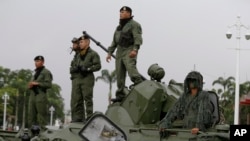Authorities have shut down two radio stations that aired critical coverage of President Nicolas Maduro's government by refusing to renew their licenses, a broadcast executive announced, as the country staged military exercises in defiance of Washington and new U.S. sanctions.
Enza Carbone, president of the country's Radio Chamber, said late Friday in a statement that the National Telecommunications Commission did not renew the stations' permits when they expired and ordered them to cease transmitting.
The National Media Workers' Union accused the government of taking "arbitrary" action and violating freedom of expression.
The closures came less than 48 hours after the commission ordered cable providers to remove the signal of Colombian TV stations Caracol and RCN. Maduro had sharply criticized foreign news coverage of the country and its months-long political crisis.
About 900,000 people, including soldiers and members of civilian militias, were expected to take part in the two days of martial drills over the weekend. Defense Minister Vladimir Padrino Lopez inaugurated the exercises Saturday at a National Guard facility in eastern Caracas where dozens of snipers practiced their aim.
Washington accuses Maduro of imposing a dictatorship after the recent installation of an all-powerful constitutional assembly that has targeted political opponents and taken over lawmaking powers from the opposition-controlled congress. In remarks earlier this month, President Donald Trump would not rule out a ``military option'' for Venezuela.
Critics call the assembly's creation a blatant, authoritarian power grab, while Maduro allies argue it offers a way out of the country's political and economic crisis.
"To greater democracy in Venezuela, the empire responds with more aggression," Padrino Lopez said, promising that the armed forces will support the government in standing up to the sanctions announced the previous day by Washington.
The sweeping penalties, which Trump signed by executive order, prohibit U.S. financial institutions from providing new money to Venezuela's government or the state oil company, PDVSA. They ban trading in two bonds the government recently issued to circumvent its increasing isolation from Western financial markets.
They also restrict PDVSA's U.S. subsidiary, Citgo, from sending dividends back to Venezuela -- a move that Maduro said would lead to the "virtual closure" of a company responsible for thousands of American jobs.
The president vowed to prosecute for treason opponents he accused of being behind the sanctions, pointing a finger in particular at Julio Borges, the president of Venezuela's congress, as the purported "mastermind" of the financial and economic "blockade."
Communication Minister Ernesto Villegas called on Venezuelans to be "understanding" in the face of the sanctions, which he said amount to a "declaration of economic war."
"Nobody should believe that there is any corner where one can be safe from an aggression of this magnitude," Villegas said in remarks at the Foreign Ministry.
The oil-rich South American nation is already suffering from three-digit inflation, shortages of foods and basic goods and a severe recession, with the International Monetary Fund estimating that the economy could shrink by 12 percent this year.
Also Saturday, opposition lawmaker Delsa Zolorzano confirmed that a detained judge was provisionally released after more than a month in custody.
Angel Zerpa was among 33 jurists appointed by congress to replace the government-stacked Supreme Court in July, a move that was blocked as Maduro vowed to arrest them all.
At least eight of the appointees have fled the country, but Zerpa was arrested in Caracas.
He was transferred Friday to a hospital to be treated for health problems due to a hunger strike and is required to check in with the courts every week.




